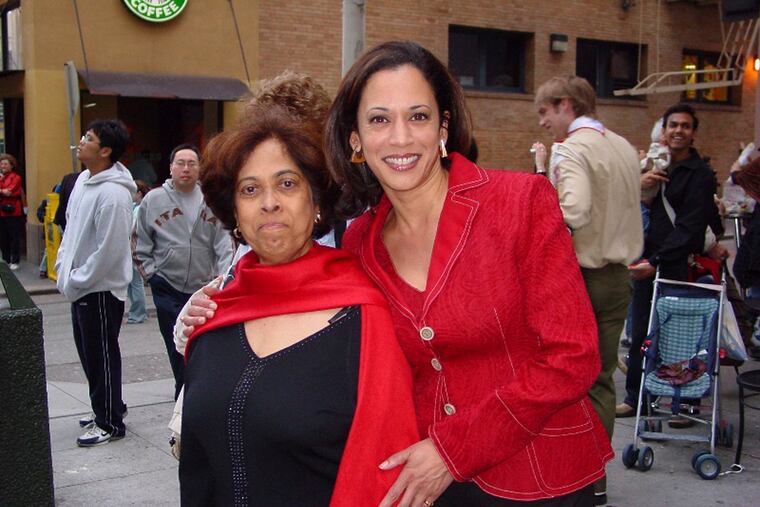Learn to say Kamala Harris’ name, and mine, too | Opinion
For the first time, someone who looks like me, with a name like mine, will be in the presidential election spotlight.

Learn to say Kamala’s name.
Last Tuesday, when Fox News host Tucker Carlson mispronounced Kamala Harris’ name on his show, Democratic political consultant Richard Goodstein stepped in to correct: “I think out of respect for somebody who’s going to be on the national ticket, pronouncing her name right is actually kind of a bare minimum.”
Carlson pushed back, misstating the name again: “So, I’m disrespecting her by mispronouncing her name unintentionally? So, it begins, You’re not allowed to criticize ‘Ka-MAL-a’ or ‘KAM-a-la’ or whatever it is.”
The Fox pundit is wrong — this isn’t about silencing criticism. It’s about getting something basic correct.
Harris dedicates an entire paragraph to the pronunciation of her name in her 2019 book, The Truths We Hold:
“First, my name is pronounced ‘comma-la,’ like the punctuation mark. It means ‘lotus flower,’ which is a symbol of significance in Indian culture. A lotus grows underwater, its flower rising above the surface while its roots are planted firmly in the river bottom.”
» READ MORE: Kamala Harris is a Howard grad like I am. Let me school you about what that means. | Jenice Armstrong
Just as Harris says her name is a symbol of her Indian culture, my name serves a similar purpose.
Growing up, I attended a predominantly white school in Delaware County, didn’t always eat the classic rice and daal (Indian lentil) for dinner, and mostly spoke English at home. My name used to be the most Indian thing about me; it was a constant connection to my culture before I came to embrace my background more fully. My name, Neha (pronounced ”nay-ha”), means love, a fact my mother reminds me of almost every day. As I grew up and began to have a greater appreciation for my heritage, my name became a symbol of my family’s sacrifice and place in America.
At school, it was normal for a teacher to ask if “nee-ha” was present at roll call, or for a coach to yell “go nii-ya” from the sideline of the tennis court. The variations of my last name were even more extreme. I rarely corrected people because I was scared of “rocking the boat” or sacrificing my chance for acceptance.
When I arrived on campus at Brown University in the fall of 2018, I attended an event hosted by the South Asian Students Association. To my surprise, the first thing they asked us to do was “introduce yourself and then say the worst mispronunciation of your name.” We all laughed in our shared experience. Obviously, I was not alone.
» READ MORE: Let the people elect the vice president | Opinion
But an honest mispronunciation is very different from a deliberate lack of effort to learn a name. The latter is a microaggression. A study in the Journal of Race, Ethnicity and Education that focused on teachers mispronouncing names concluded that “subtle experiences with racism can have a lasting impact on the self-perceptions and worldviews of a child.”
One of these lasting impacts is the feeling of a lack of acceptance. Osayuwamen Ede-Osifo, a Nigerian American student from New York, told me, “When people don’t even try to say my name, it’s like they don’t care about my history”
Ede-Osifo’s first name was given to her by her maternal grandfather. Her last name comes from part of her father’s name and part of her paternal grandfather’s name. “It is an intricate and intentional naming which is a large part of my identity,” says Ede-Osifo.
It can also be a question of basic respect. “If someone makes the effort to see if they pronounced my name correctly, it is a sign that they respect me,” says Kriti Devkota, a Nepali American student from Rhode Island.
» READ MORE: Asian Americans represent untapped voting power in the U.S. | Opinion
Those of us growing up as first- or second-generation Americans straddle two worlds. That’s just our reality. When someone refuses to make an effort in learning our names, we can experience it as a rejection of this dual identity.
A Harris run for the vice presidency not only brings around historic change but also important conversations surrounding structural racism and sexism. While the correct pronunciation of a name is a very small part of this larger conversation, it is one way our political process can become more inclusive. For the first time, someone who looks like me, with a name like mine, will be in the presidential election spotlight. Learn to say Kamala’s name. And while you’re at it, learn mine, too.
Neha Mukherjee is an Indian American writer from the Philadelphia area and the president of the South Asian Students Association at Brown University.